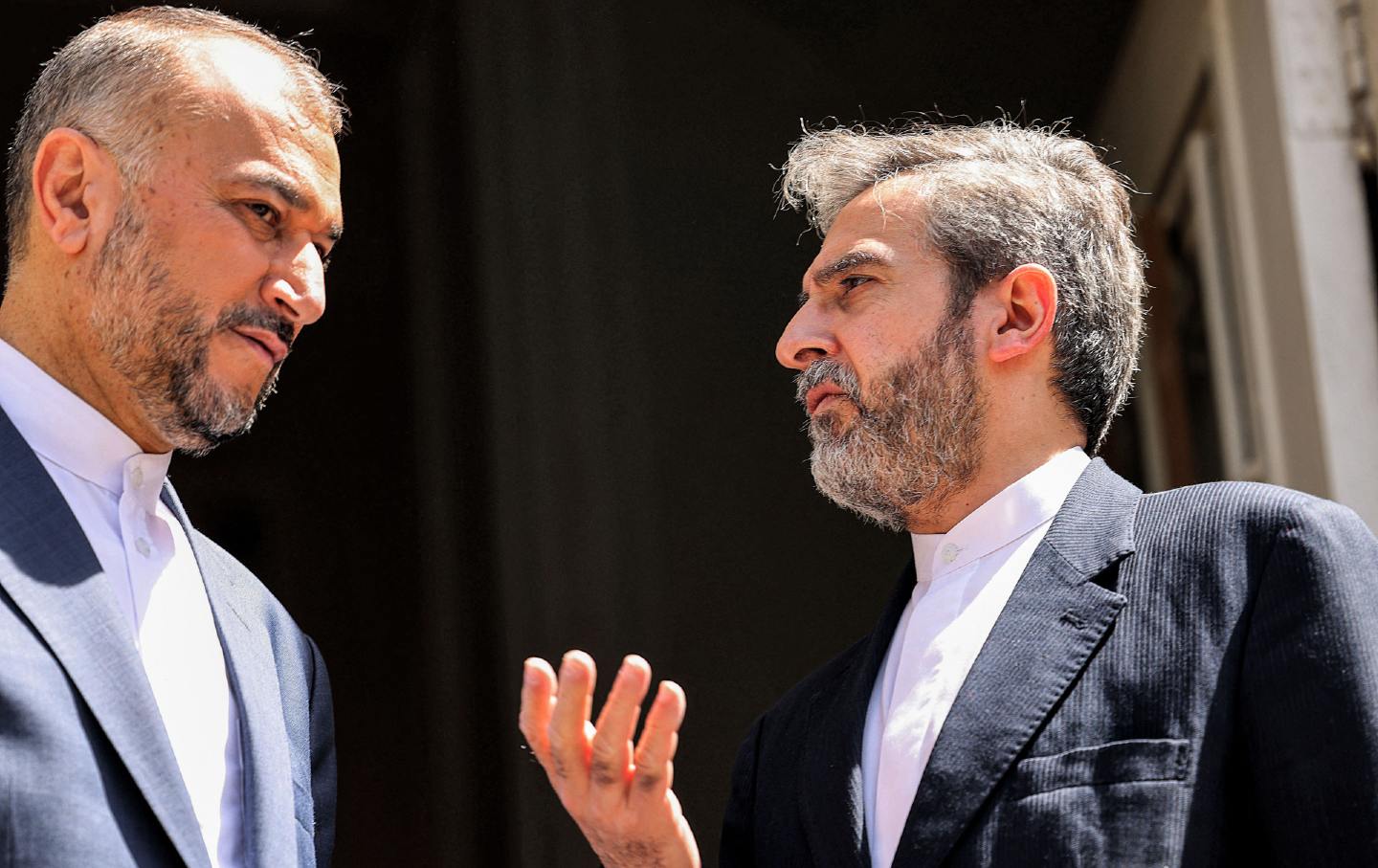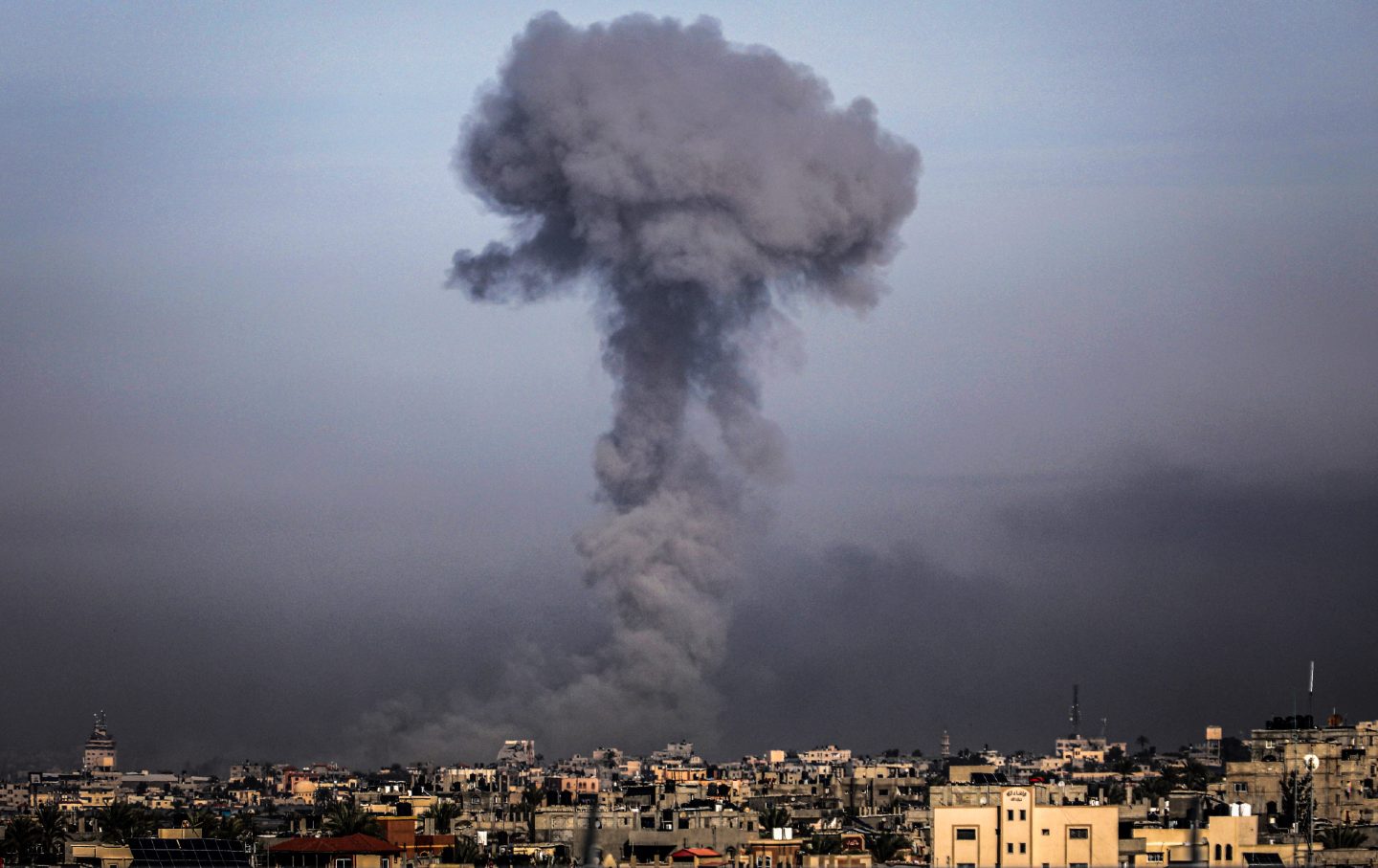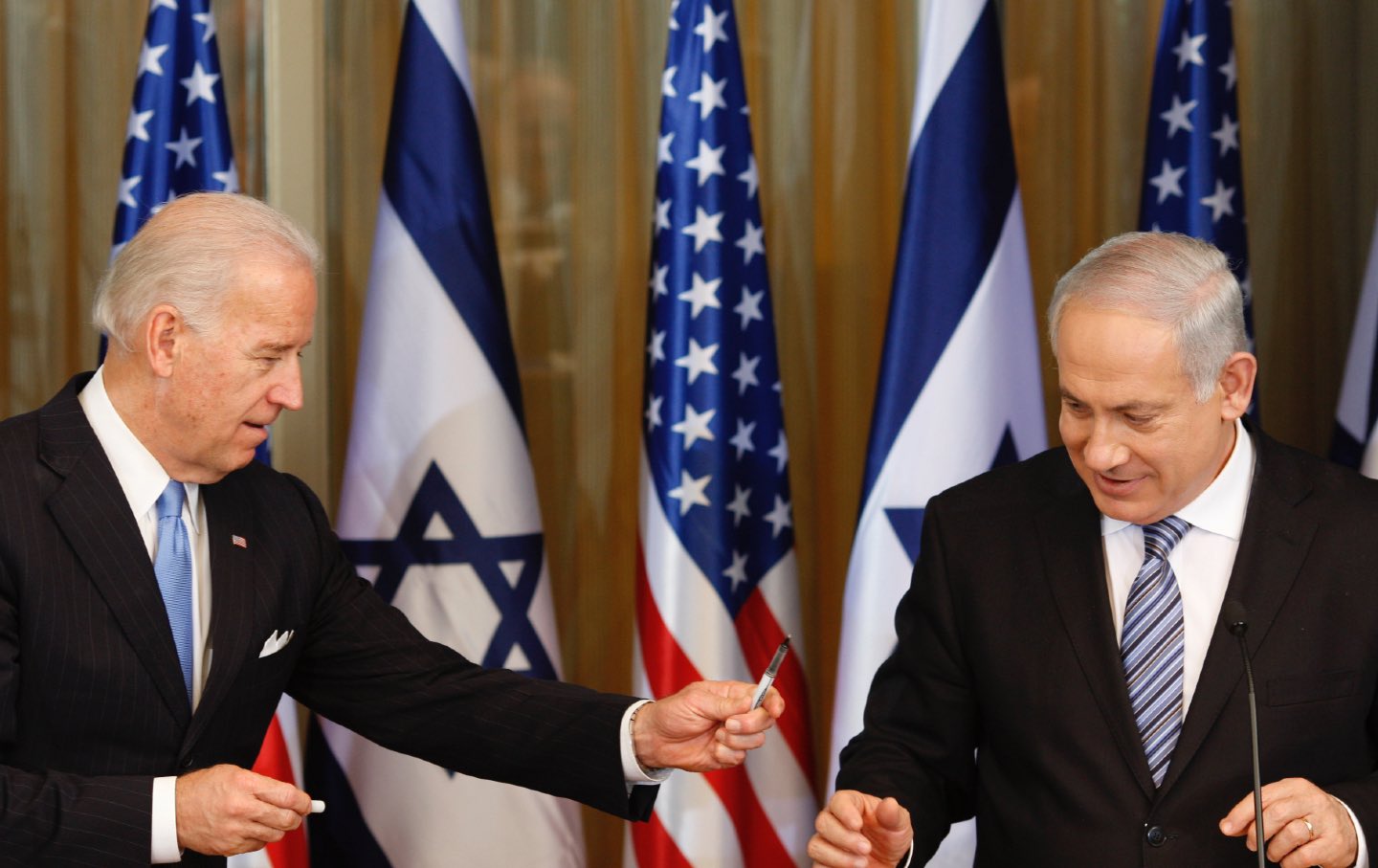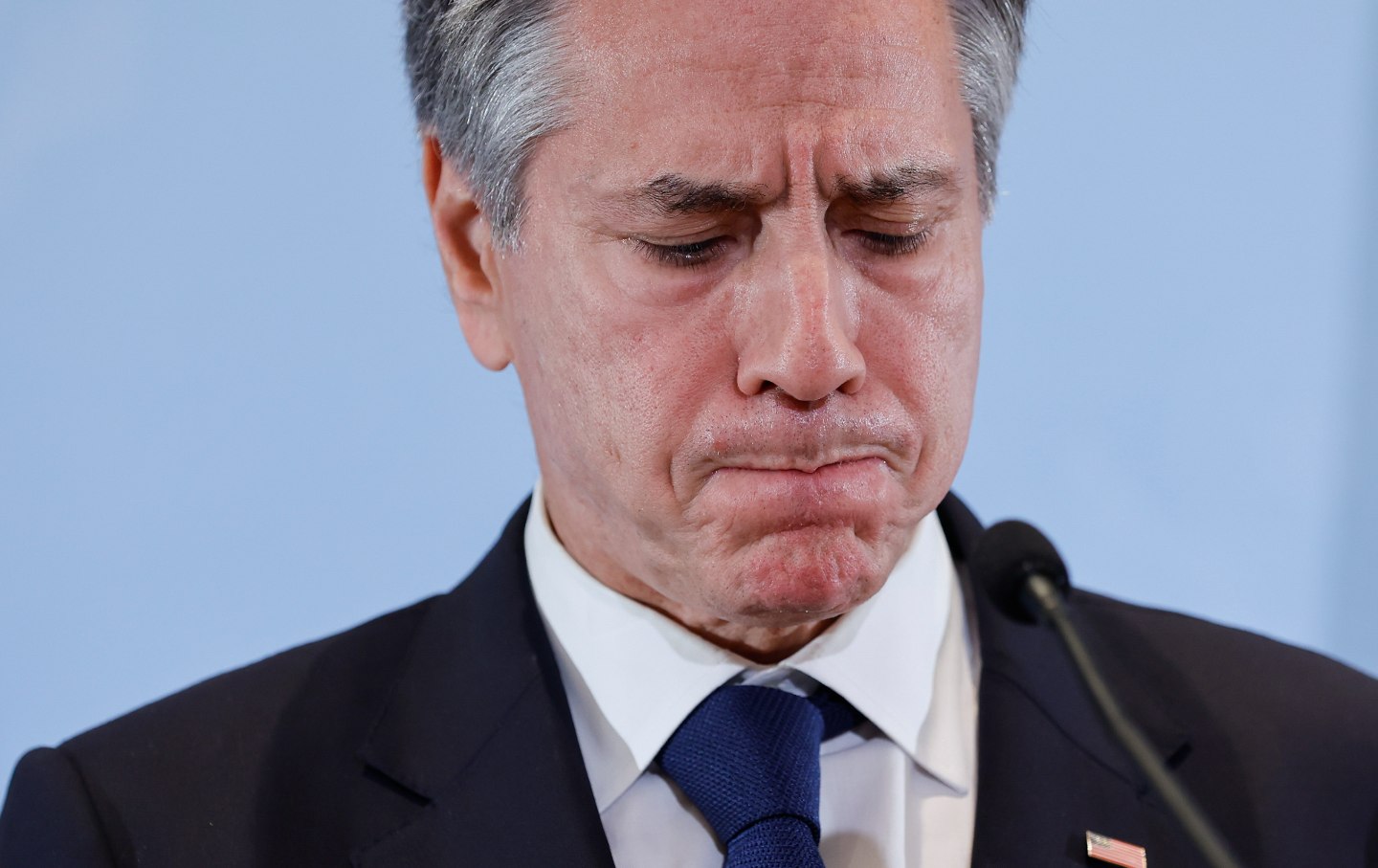Requiem for the Biden of the Afghanistan Withdrawal
The brightest moment in the president’s foreign policy feels like light from a dead star. The Biden of that moment would stop aiding Israeli war crimes.
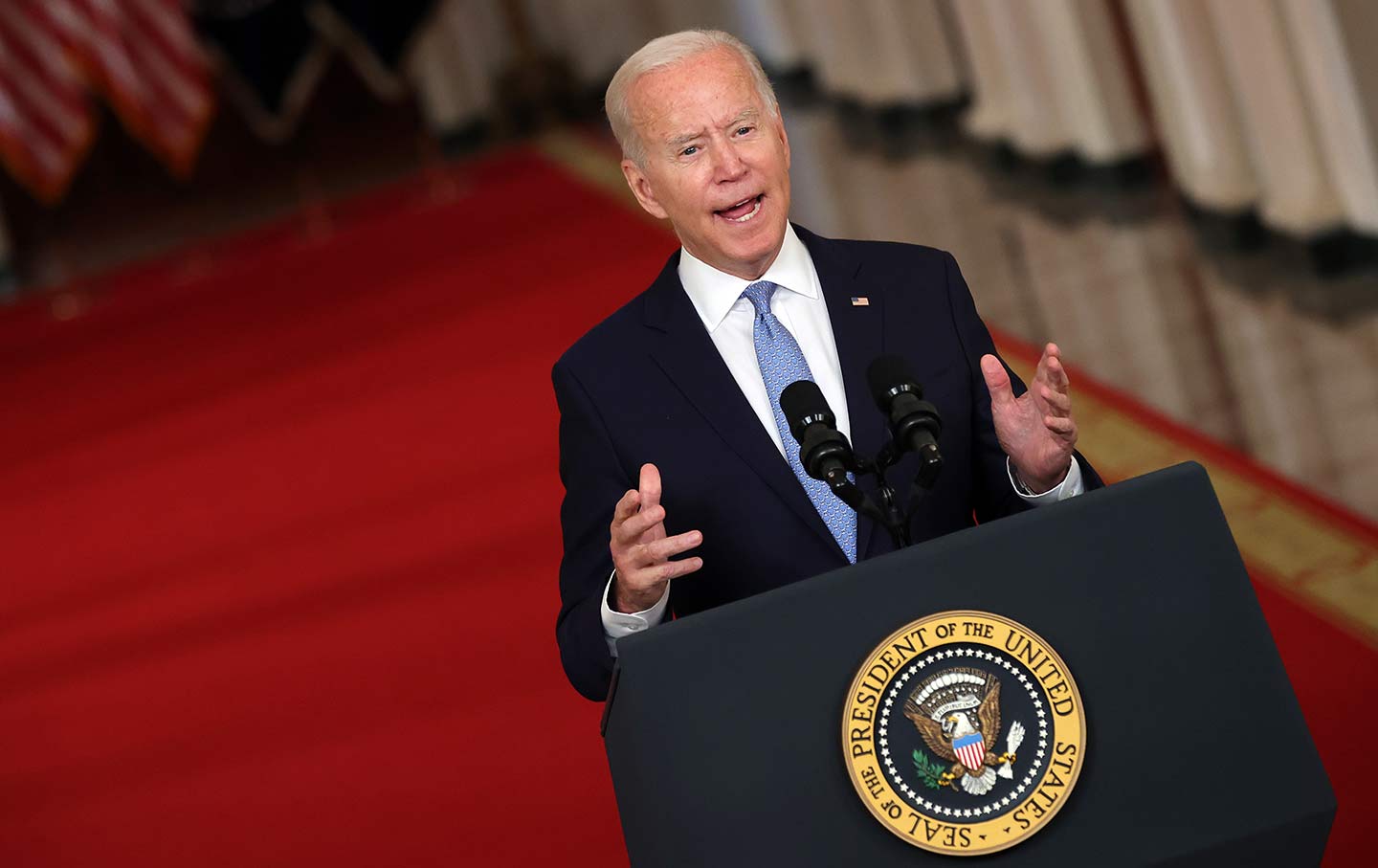
For a moment in 2021, it was possible to believe that Joe Biden might pull US foreign policy out of the 20-year wreckage that he’d helped to create. Like almost every US politician after 9/11, Biden, then a senator, cheered the invasion and occupation of Afghanistan. But by the time he became vice president in 2009, Biden recognized that the war had become a quagmire. While he wasn’t ready to pull up stakes, he advised Barack Obama against escalation, to no avail. When he was elected president himself, Biden inherited the agreement for a withdrawal from Afghanistan that Donald Trump had negotiated with the Taliban. Taking a big political risk, Biden seized the opportunity.
The spectacle of desperate Afghans flocking to the Kabul airport during a Taliban military takeover created one of the first crises of Biden’s presidency. Politicians and journalists called the withdrawal a disgrace. But Biden argued that the war was irredeemable and its costs unjustifiable. A month before he pulled the US military out, he said, “Nearly 20 years of experience has shown us that the current security situation only confirms that ‘just one more year’ of fighting in Afghanistan is not a solution but a recipe for being there indefinitely.”
It’s important to acknowledge the errors of the Biden withdrawal. For starters, the administration has admitted only about 90,000 Afghans to the United States, out of a post-2021 refugee population estimated at 1.6 million, prioritizing those who worked for the Americans. Biden also violated the withdrawal timetable that had been agreed to. Then, as the Taliban was taking power, a US drone strike incinerated 10 civilians, including seven children. Biden later put an asterisk on the departure by reserving the right to keep bombing Afghanistan, and the US seized billions of dollars of sovereign Afghan wealth.
Biden never offered a moral indictment of the war. But he recognized that it had become contrary to US interests, and he stuck with that assessment. “I was not going to extend this forever war, and I was not extending a forever exit,” he said. It was more than an overdue policy decision; it was an indication of Biden’s own growth.
But the Biden who withdrew from Afghanistan is not the one people will remember. They will remember the one who materially aided what the International Court of Justice (ICJ) called plausibly genocidal actions by Israel.
The October 7 Hamas massacre returned Biden to his September 11 form. His insistence on unconditional solidarity with Israel ignores the stranglehold that Israel has had on Gaza since 2007, let alone its illegal 50-year occupation of the West Bank or its emergent apartheid rule. The ghost of that earlier, wiser Biden seemed to briefly reappear when, in Tel Aviv 10 days after the Hamas attack, he urged Israel to avoid the United States’ post-9/11 “mistakes” and not let itself be “consumed” by rage. But rather than signaling a shift, Biden’s words inaugurated a pattern of willful blindness.
Israel’s senior officials, especially Prime Minister Benjamin Netanyahu and Defense Minister Yoav Gallant, deemed the residents of Gaza collectively responsible for the Hamas attack and acted accordingly. By early February, Israel had killed more than 27,000 Palestinians, even as US intelligence officials told Congress that Israel wasn’t close to eliminating Hamas, the stated objective of the war. An IDF reservist and aspiring Gaza settler, speaking to The New York Times, suggested a different objective: “The minute the war is over, we’ll build our homes there.”
Biden is uninterested in hearing such sentiments. The State Department pretended that calls to expel the Palestinians from Gaza by two cabinet ministers did not “reflect the policy of the Israeli government.” Secretary of State Antony Blinken dismissed South Africa’s accusation of genocide as “meritless” weeks before the ICJ validated it. The flailing administration has attempted to achieve an impossible balance: decrying the horrific Palestinian death toll while arming Israel and defending its war diplomatically.
Predictably, Netanyahu’s intransigence has intensified under US protection. He rejected a proposal, central to Biden’s attempts to seem in control of events, for a postwar path to Palestinian statehood. Then he sank negotiations with Hamas for a release of its Israeli hostages in exchange for a cease-fire, vowing instead to fight until “total victory.” While Americans watched the Super Bowl, Israel began a devastating bombing of Rafah, the overcrowded city where hundreds of thousands of Palestinians have fled, an apparent prelude to an invasion that Netanyahu said would involve “the evacuation of the civilian population” to places unspecified. Biden warned him against it. But louder than his warning is the $14 billion aid package for Israel moving through Congress.
While insisting that he wants to avoid escalation, Biden has helped to engulf the Middle East in war. A network of militias with ties to Iran has seized the opportunity provided by the Israeli assault. US bases in Iraq and Syria have come under dozens of rocket, missile, and drone attacks. The Houthis in Yemen attacked Red Sea commercial shipping to put international pressure on Israel. But rather than restrain Israel from destroying Gaza, Biden ordered a “sustained military campaign” against the Houthis and, following a drone strike in Jordan that killed three US Army reservists, an escalation against the Iran-backed militias that jeopardizes the entire US presence in Iraq.
Even as the US drifts dangerously toward an open confrontation with Iran, the White House has not pursued negotiations with Tehran to contain the conflict, let alone end it. “There’s been no communications with Iran since the attack that killed our three soldiers in Jordan,” spokesman John Kirby said.
For five horrifying months, Israel—with Biden’s backing—has embraced and amplified the US War on Terror’s most catastrophic tendencies. The hopelessness of the forever war is what drove Biden to get out of Afghanistan. But the wisdom of that decision now feels like light from a dead star.
Biden may sacrifice his presidency for Israel’s war. He has quite likely sacrificed his legacy for it. As Ukraine learned, no one outside the West will heed human-rights entreaties from governments who sponsored the bloodshed in Gaza. Every day is another missed chance for Biden to cut off aid to Israel, force it to end its onslaught, negotiate a hostage release, and begin discussions with Iran for regional deescalation. The Biden of the Afghanistan withdrawal knows there is no alternative besides the graveyard.



